Karnataka High Court Upholds Order Of Disqualification Of Man From Continuing In DCC Bank
The Karnataka High Court confirmed the order passed by the Single Judge wherein the petition filed by the appellant was dismissed and the order passed by the Joint Registrar of Co-operative Societies disqualifying him from continuing in any post in District Central Co-operative Bank, Shimogga (DCC) was upheld.
The appellant had filed an appeal under Section 4 of the Karnataka High Court Act praying to allow his appeal by setting aside the order passed by the Single Judge.
A Division Bench comprising Justice Alok Aradhe and Justice S. Vishwajith Shetty held, “The appellant is precluded by his conduct to raise the issue of jurisdiction of JRCS, Chitradurga as he agreed to remand of the matter to any of the four joint registrarsThe appellant has been sitting on the fence and has waited for the outcome of the proceeding initiated by JRCS, Chitradurga. His conduct therefore, disentitles him to any relief in exercise of extraordinary jurisdiction under Article 226 of the Constitution of India. The writ court was justified in declining to exercise its extraordinary discretionary jurisdiction in favour of the appellant who had acquiesced in passing of the order dated 14.08.2022 by Learned Single Judge.”
The Bench further noted that the State Government is the competent authority to confer the powers of Joint Registrar Cooperative Societies to any additional registrar of the cooperative society.
“In any case, the from the stand taken by the government before the Learned Single Judge, it can safely be inferred that it had conferred the power on JRCS, Chitradurga to decide the dispute. The instant case is therefore, not a case of inherent lack of jurisdiction”, the Court said.
Senior Advocate Jaya Kumar S. Patil appeared for the appellant while AG Prabhuling K. Navadgi, AAG R. Subramanya, HCGP B. Rajendra Prasad, and Senior Advocate Ashok Haranahalli represented the respondents.
Facts of the Case –
The appellant was an elected Director and President of DCC and was disqualified by an order passed by Joint Registrar, Cooperative Societies, Bengaluru (JRCS). The said order was challenged by the appellant and the Single Judge set aside the order of disqualification and directed an enquiry to be conducted by the Joint Registrar, Cooperative Societies and Managing Director of DCC, Chitradurga within six weeks.
After remand, the JRCS disqualified the appellant from continuing any post in the DCC Bank for a period of five years. Pursuant to the aforesaid order, the State Cooperative Election Authority passed a consequential order. The appellant challenged the aforesaid order in a writ petition before the Single Judge but the same got dismissed. However, liberty was reserved for the appellant to avail of the alternate remedy. Hence, the appellant being aggrieved by this approached the Division Bench of the High Court.
The High Court in view of the facts and circumstances of the case noted, “… the order passed by the Learned Single Judge was passed with the consent of the appellant, which was upheld by division bench of this court. Neither in the writ petition nor in the appeal, the appellant raised the issue with regard to jurisdiction of the JRCS, Chitradurga to adjudicate the dispute with regard to disqualification of the appellant. … the appellant did not raise any objection with regard to jurisdiction of the JRCS, Chitradurga even in the proceeding before him.”
The Court also asserted that the contention made by the counsel for the appellant that he did not give consent for the passing of the order by the Single Judge does not deserve acceptance.
“The State Government is the competent authority to confer powers of joint registrar on any of assistant registrar and therefore, in the facts of the case, the memo filed on behalf of the State Government has to be construed as conferring power on the JRCS, Chitradurga to decide the dispute pertaining to disqualification of the appellant. … the contention of the appellant that JRCS, Chitradurga was not competent to decide the dispute is negatived”, said the Court.
The Court further observed that the order of JRCS is appealable under Section 106 of the Karnataka Cooperative Societies Act and hence permitted the appellant to raise his contentions in an appeal.
“In case, such an appeal is filed within a period of three weeks from today, the appellate authority shall decide the appeal expeditiously after hearing the parties within a period of six weeks from the date of filing of the appeal. It is clarified that we have not expressed any opinion on merits of the matter. …. we do not find any ground to differ with the conclusion arrived at by the Learned Single Judge.”
Accordingly, the Court disposed of the appeal.
Cause Title- R.M. Manjunath Gowda v. The State Of Karnataka & Ors.
Click here to read/download the Judgment




